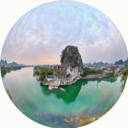0 Likes
Rumšiškės
From Wikipedia, the free encyclopedia
Rumšiškės is a Lithuanian town (population 1,700), situated 20 km (12 mi) east of Kaunas on the northern bank of Kaunas Reservoir. Southern part of the town (including the birthplace of Lithuanian poet Jonas Aistis) is now under the waters of the artificial lake. The 18th century St. Michael Archangel church of Rumšiškės (rebuilt in 19th century) was saved and moved to its present place in 1958, when the reservoir was created.
History
Rumšiškės was first mentioned in the 14th century. In 1940–1941, a Soviet concentration camp was created in a nearby village of Pravieniškės. After 1941 the camp was used by the Nazis. Around 700 Lithuanian Jews were murdered by the Nazis near Rumšiškės during World War II. [1]
The old Rumšiškės was flooded by the Kaunas Lagoon, an artificial lake created by a dam built at Kaunas in the 1950s.
Open air ethnographic museum
Today, Rumšiškės is best known for its excellent open-air ethnographic museum (established in 1966 and opened in 1974), one of the largest in Europe.
The open-air museum in Rumšiškės displays the heritage of Lithuanian rural life in a vast collection of authentic resurrected buildings where the Lithuanian people lived and worked. The total area of 175 ha (432 acre) contains 140 buildings from the 18th–19th century with the restored original interiors and surroundings. This museum was established to help to preserve and research the former ways of living.
The buildings of this museum are exposed as farmsteads and all of them together represent the main ethnographic regions of Lithuania: Aukštaitija, Samogitia, Dzūkija and Suvalkija. The open-air museum stores the most valuable examples of Lithuanian farmsteads.
The territory of the museum is a very popular place where ethnographic festivals are celebrated and folk song and dance concerts are held. This museum is very easy to reach since it is located 18 km (11 mi) to the east of Kaunas near the Kaunas-Vilnius highway. Rumšiškės belongs to the Kaunas Reservoir Regional Park.The museum was featured in the reality show The Amazing Race 12 in 2007.
http://en.wikipedia.org/wiki/Rum%C5%A1i%C5%A1k%C4%97s
...




